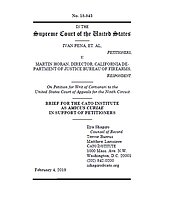Learn more about Cato’s Amicus Briefs Program.
Everyone knows the government can’t ban political speech, but what about putting conditions on it? The Supreme Court has (for better or for worse) upheld noise ordinances and restrictions on the time, place, and manner of speech, but what if a state banned political speech with an exception for those who could successfully turn lead into gold? Would this be a complete ban? Or would the impossible alchemists’ exception mean it could somehow be squared with the First Amendment?
That hypothetical might sound absurd, but is effectively how California currently treats handguns. California’s Crime Gun Identification Act of 2007 was the first piece of legislation to require firearms in the United States to contain “microstamping” technology. It requires that any new semiautomatic handgun sold in California must stamp each fired casing in two locations with “a microscopic array of characters that identify the make, model, and serial number of the pistol.”
There are a number of problems with this law, but one stood out to us: the technology to do what California demands does not exist. While a patent exists and prototypes were tested, the concept remains “unreliable, easily defeated and simply impossible to implement.” Because of this, no gunmaker has been able to introduce a new firearm to California since 2013.
Ivan Pena, Roy Vargas, the Second Amendment Foundation, and others challenged the law in federal court. Pena had sought to buy a handgun that was previously legal in California, while Vargas, who was born without an arm below the right elbow, was unable to buy a new firearm with controls best suited to his needs. The district court found for the state and the Ninth Circuit affirmed, believing that the technology was perfectly feasible (despite a lack of evidence) but that gun companies simply didn’t want to comply.
The plaintiffs now seek Supreme Court review, hoping to have their right to arms vindicated. Because the law cannot require the impossible, especially in the context of fundamental rights, Cato has filed an amicus brief supporting the petition.
We provide a technical primer on the functionality of semi-automatic handguns, explaining why what California is asking for is impossible. As the Court made clear in D.C. v. Heller (2008), a “prohibition of an entire class of ‘arms’… overwhelmingly chosen by American society” for lawful purposes is unconstitutional. That’s precisely what California is attempting here: to slowly but surely ban the sale of new handguns—the weapons Americans overwhelmingly choose for self-defense—through the imposition of impossible conditions.
The Second Amendment was not written to reward lawmakers for using creative and confusing mechanisms to reach the same ends the Constitution forbids. Allowing this broad, unreasonable ban contravenes the Founding-era understanding that the Second Amendment protects the right of all American to buy and sell commonly used arms for lawful purposes nationwide.

This work is licensed under a Creative Commons Attribution-NonCommercial-ShareAlike 4.0 International License.



